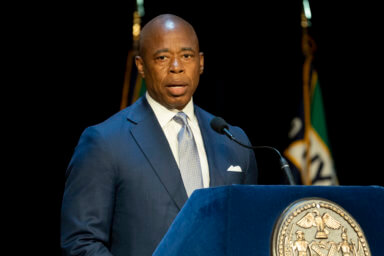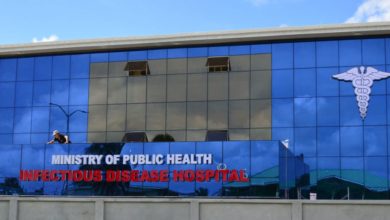Adams’s plan for treating individuals with severe mental illness

New York City Mayor, Eric Adams on Tuesday announced a new pathway forward to address the ongoing crisis of individuals experiencing severe mental illnesses left untreated and unsheltered in New York City’s streets and subways.
In a public address, Adams detailed a compassionate new vision to tackle this crisis, beginning with a directive being issued immediately to city agencies and contractors involved in evaluating and providing care to individuals in psychiatric crisis, so that more people in need of help receive it.
The mayor also laid out an 11-point legislative agenda that will be among his top priorities in Albany during the upcoming legislative session.
The agenda takes aim at gaps in New York State’s Mental Hygiene Law that intensify the city’s challenges in meeting the needs of its most vulnerable residents with severe mental illness.
Adams also announced new clinical co-response teams deployed in New York City’s subways to respond to those with serious mental health issues, as well as an enhanced training in partnership with New York State for all first responders to compassionately care for those in crisis.
In accordance with state law and court precedent, Adams’s directive clarifies that outreach workers, city-operated hospitals and first responders have the legal authority to provide care to New Yorkers when severe mental illness prevents them from meeting their own basic human needs to the extent that they are a danger to themselves.
The directive — issued by Mayor Adams on Tuesday — seeks to dispel a persistent myth that the legal standard for involuntary intervention requires an “overt act” demonstrating that the person is violent, suicidal or engaging in outrageously dangerous behavior likely to result in imminent harm.
He also announced that the city is developing a tele-consult line to provide police officers in the field with direct access to clinicians.
This new tele-consult line will provide critical clinical advice to police officers when dealing with individuals in distress and ensure a compassionate response for those suffering with untreated serious mental illness.
“My administration is determined to do more to assist people with mental illness, especially those with untreated psychotic disorders who pose a risk of harm to themselves, even if they are not an imminent threat to the public,” Adams said. “It is not acceptable for us to see someone who clearly needs help and walk past.
“For too long, there has been a gray area where policy, law and accountability have not been clear, and this has allowed people in need to slip through the cracks,” he added. “This culture of uncertainty has led to untold suffering and deep frustration. It cannot continue.
“We need to change that culture and clarify our expectations,” the mayor continued. “No more walking by or looking away. No more passing the buck.
“Going forward, we will focus on action, care and compassion,” he continued. “If severe mental illness is causing someone to be unsheltered and a danger to themselves, we have a moral obligation to help them get the treatment and care they need.”
Measures in Mayor Adams’ legislative agenda announced on Tuesday include: Making the law explicit that a person requires care when their mental illness prevents them from meeting their own basic needs; mandating that hospital clinicians consider a range of factors when assessing a patient’s need for involuntary admission or retention, including known treatment history and current ability to adhere to outpatient treatment; and requiring hospitals to screen all psychiatric patients prior to discharge for their need to receive “assisted outpatient treatment” (court-ordered care under “Kendra’s Law”).
The legislative agenda also includes allowing a broader range of trained mental health professionals to perform evaluations and community removals of individuals in crisis; and requiring hospitals to notify known community providers when their clients are admitted or released and collaborate with community providers in preparing patients for discharge.
Ahead of the winter months — when homelessness typically increases on subways due to the cold weather — the Adams administration has begun deploying subway clinical co-response teams, made up of joint patrols of the New York City Department of Health and Mental Hygiene (DOHMH) and the New York City Police Department (NYPD), to patrol high-traffic subway stations and respond with a clinician-led approach to those appearing to have serious mental health issues.
In partnership with New York State, the city will also provide comprehensive training to all clinicians, outreach workers, and first responders to ensure compassionate care that potentially could include involuntary removals when interacting with individuals in distress suffering from severe mental illnesses. The city will be rolling out this training immediately.
“With this announcement, we are bolstering our strategies to get people who are in danger due to untreated severe mental illness the help they need,” said Deputy Mayor for Health and Human Services Anne Williams-Isom. “We are adding layers of additional support for our first responders to work with clinical specialists in the moment and at the time it is needed, and we are pursuing all other areas for assistance: Health, social services, legal, and legislative. Thank you to our teams across government working to see that this is a coordinated, whole-of-government effort.”
“You can’t effectively have public safety without adequate mental health care — the two go hand-in-hand,” said Deputy Mayor for Public Safety Philip Banks III. “For too long, public safety personnel’s hands have been tied in getting those in need care before they hurt themselves or others. These directives and proposals are a common-sense way to clear those impediments and get help for those who need it most.”
“The NYPD works day and night to improve the quality of life of all New Yorkers, especially our city’s most vulnerable populations,” said New York City Police Department (NYPD) Commissioner Keechant L. Sewell. “This is a longstanding and very complex issue. And we will continue to work closely with our many partners to ensure that everyone has access to the services they require. This deserves the full support and attention of our collective efforts.”
“Responding to New Yorkers in need is the mission of the Fire Department, and we are proud to partner with Mayor Adams in addressing this critical public safety issue,” said Fire Department of the City of New York (FDNY) Commissioner Laura Kavanagh. “Our mission is simple: To be there for all New Yorkers when they need help and provide critical mental health care.”
“People living with serious mental illness deserve to live their lives with dignity, respect, and free from discrimination and stigma,” said DOHMH Commissioner Dr. Ashwin Vasan. “As a city, this work — at the intersection of public safety and mental illness — represents part of the larger strategy, which is centered on providing everyone living with serious mental illness the basic building blocks of recovery: Health care, a home, and a community.
“We know that focusing on these pillars will reduce the number of people we see in need on our streets and in our subways to begin with, and is consistent with Mayor Adams’ focus on balancing prevention and intervention,” he added. “The city is galvanized to address the broader issue of supporting people with serious mental illness to improve health, prevent suffering and isolation, and improve their quality of life. In the coming weeks, we’ll be turning to trusted community groups to inform a comprehensive vision aimed at improving access to care and housing and reducing social isolation.”
“We are proud of our cross-agency partnership with the city’s Health Department, Health + Hospitals, NYPD, and FDNY-EMS to develop these new protocols and trainings” said Mayor’s Office of Community Mental Health (OCMH) Director Eva Wong. “Helping our fellow New Yorkers most in need get connected to care is a top priority for OCMH.
“These new protocols and trainings will ensure that agencies and systems responsible for connecting our community members with severe mental illnesses to treatments are working in unison to get them the support they need and deserve,” she added. “We look forward to continuing our work with city and state agencies as we partner to bring compassionate care to all New Yorkers.”
“With today’s announcement, Mayor Adams has reaffirmed his commitment to meeting the concurrent crises of untreated mental illness and unsheltered homelessness head on,” said New York City Department of Social Services (DSS) Commissioner Gary P. Jenkins. “As part of the Subway Safety Plan, DSS-DHS outreach staff and our partners are making great strides to connect New Yorkers experiencing homelessness in the subways to critical shelter services.
“This new plan builds on existing efforts like these to more efficiently and effectively engage New Yorkers experiencing mental health crises and ensure they receive the services they often desperately need,” he added. “We commend the mayor for continuing to lead on this issue and assembling the resources necessary to support our neighbors in need.”
“The city has a moral obligation to assist homeless New Yorkers suffering from untreated severe mental illness who are unable to meet their basic needs to such an extent that they are a danger to themselves,” said New York City Corporation Counsel Barbadian-born Sylvia Hinds-Radix.
“The mayor’s comprehensive plan demonstrates this administration’s commitment to using every tool at its disposal to ensure outreach workers, city-operated hospitals, and first responders are able to provide the necessary care that these individuals so desperately need,” she added.



